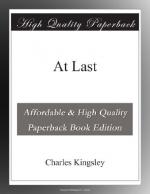In Herbert Dorrance’s honest admiration and assiduous courtship the most suspicious scrutiny could detect no tincture of either of these feelings, and it was not long before she took refuge in his society from the risk of being wounded and angered by the supposed exhibition of them in others. Here was one man who could not but know of her folly, in all its length, breadth, and depth, who was a witness of her daily chastisement for it at her guardian’s hands, yet who esteemed her unsullied by the unworthy attachment, undegraded by punishment. Gratitude had a powerful auxiliary in her feverish longing to escape from scenes that kept alive to the quick, memories she would have annihilated, had her ability been commensurate with her will. All other associations with the house in which she, and her father before her, had been born, and in which she had passed her childhood and girlish days, were overrun by the thickly thronging and pertinacious recollections of the two short weeks Frederic Chilton had spent there with her. He haunted her walks and drives; trod, by her side, the resounding floor of the vine-covered portico, sat with her in parlor and halls; sang to her accompaniment when she would have exorcised the phantom by music—was always, whenever and wherever he appeared—the tender, ingenuous, manly youth she had loved and reverenced as the impersonation of her ideal lord; the demi-god whom she had worshipped, heart and soul—set, in her exulting imagination no lower than the angels, and beheld in the end,—with besmirched brow and debased mien, a disgraced sensualist, not merely a deceiver of another woman’s innocent confidence, and her tempter to dishonor and wretchedness, but a poltroon—a whipped coward who had not dared to lift voice or pen in denial or extenuation of his crime.
The law of reaction is of more nearly universal application in moral and in physical science than men are willing to believe. We have seen how cunningly Rosa calculated upon it, and wiser people than she, every day, attribute the most momentous actions of their lives to its influence.
“My advice to every woman is to marry for goodness—simple integrity of word and deed!” said a lady, once in my hearing.
She was an excellent scholar, attractive in person and in manner, gifted in conversation and opulent in purse. Her hand had been sought in marriage by more than one, and in early womanhood she had made choice among her suitors of a man whose plausible exterior was the screen of a black heart and infamous life. Convinced of her mistake barely in time to escape copartnership in his stained name and ruined fortunes, she set up the history of her deadly peril as a beacon to others as ardent and unwary as her old-time self. Either to put a double point upon the moral, or to insure herself against similar mishap in the future, she wedded an amiable and correct fool, a mere incidental in the work of human creation, who was as incapable of making his mark upon the age that produced him as an angle-worm is of lettering solid granite.




